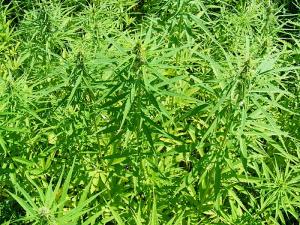Hemp farming now legal in Delaware
Legislation paving the way for industrial hemp farming in Delaware was signed into law in 2018, pending approval at the federal level in the 2018 Farm Bill.
The bill was signed into law by President Donald Trump before Christmas, but Delaware Farm Bureau President Richard Wilkins said recently he doesn’t know any commercial farmers in the state who are planning to use the new law.
Somebody or some company has to have an interest in creating a processing facility where they can take advantage of an economy of scale and efficiencies, he said Dec. 26.
Wilkins said in the future, customers looking for locally grown hemp products might find them at places like a local farmers market. Someone might be able to set up a home-based processing facility to make CBD oils and fiber-based products, but they’ll most likely be filling a niche market.
The Delaware Industrial Hemp Farming bill, Senate Bill 266, permits the Delaware Department of Agriculture to classify hemp as a grain and gave farmers the ability to immediately start cultivating the crop once the federal government passed the 2018 Farm Bill. Gov. John Carney signed the bill in September.
All three Cape Region legislators – Speaker of the House Rep. Pete Schwartzkopf, D-Rehoboth, Rep. Steve Smyk, R-Milton/Lewes, and Sen. Ernie Lopez, R-Lewes –voted in favor of the bill. All three were re-elected in November.
In a prepared statement Aug. 28, with the signing of the state-level bill, Secretary of Agriculture Michael Scuse said Delaware farmers are one step closer to a new crop to diversify their farming operations.
Scuse was not available for comment, but in an email Dec. 21, Stacey Hoffman, department spokeswoman, said the Farm Bill is a complex piece of legislation and the department is currently reviewing all of it to see how it will impact farmers and Delaware.
In the Farm Bill, hemp is defined as the cannabis plant, but it cannot contain more than 0.3 percent of tetrahydrocannabinol, the chemical that gets a person high. The bill allows the transfer of hemp-derived products across state lines for commercial purposes. The bill also puts no restrictions on the sale, transport, or possession of hemp-derived products.
Wilkins said he did not know anyone currently thinking of producing industrial hemp at a commercial level, but he said the farm bureau supports the measure. At the annual policy committee meeting, he said support of the bill passed by voice vote, and he didn’t recall any dissension.
Related to farming equipment and harvesting, Wilkins said he thought there’s a chance farmers would adapt as they traditionally do, to modify harvesting equipment.
Wilkins said different varieties of hemp can be grown – some are short and heavy on seeds that could be grown for oils, while others are taller to maximize pounds of fiber per acre.
Wilkins said it’s yet to be determined if industrial hemp is suited for Delaware’s growing environment. He said he hopes the University of Delaware, Delaware State University or the University of Maryland will undertake studies.
The farm bureau isn’t the only group supporting industrial hemp in Delaware.
In an email Dec. 24, Zoë Patchell, Delaware Cannabis Advocacy Network executive director, said the hemp plant is one of the most versatile plants on the planet. She said it can be manufactured into many products, including food, beverages, nutritional supplements, bioplastic, construction materials, cosmetic products, animal feed, rope, textiles and paper.
Patchell said hemp can also be used for farming as a cover crop and for improving soil quality through phytoremediation, which extracts heavy metals and other pollutants from soil.
“The vast array of hemp products, which are already legally sold in Delaware, will be permitted to be cultivated and manufactured on Delaware soil, instead of being imported from other countries or states that have legalized hemp,” she said.
As for the legalization of marijuana in Delaware, despite being closely biologically related, Patchell said hemp and cannabis are separate policy issues. She said the legalization of hemp will help destigmatize its still-illegal cousin and re-educate people about the many benefits of both hemp and cannabis.
Chris Flood has been working for the Cape Gazette since early 2014. He currently covers Rehoboth Beach and Henlopen Acres, but has also covered Dewey Beach and the state government. He covers environmental stories, business stories and random stories on subjects he finds interesting, and he also writes a column called Choppin’ Wood that runs every other week. He’s a graduate of the University of Maine and the Landing School of Boat Building & Design.




















































